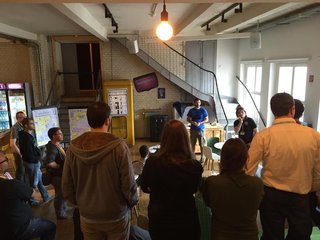A Coderetreat is a full day hands-on coding workshop focused on the fundamentals of software development, software design and communication. During the day participants get several chances to try something completely different and have the opportunity to learn new ways of coding and testing, programming languages or IDE usage. A Coderetreat is a funny and exciting day for the people, sharing their thoughts on Test Driven Development (TDD), Simple Design and more.
The Role of the Facilitator
A Coderetreat is run by one or more moderators, called facilitators, who are an essential part of every Coderetreat. The facilitator guides the participants through the day and helps people to learn as much as possible. Different facilitators have different styles. (I like to explore these styles and travel to co-facilitate Coderetreats with other people, as I did for last year's GDCR.)
 Hosting an Inhouse Coderetreat
Hosting an Inhouse CoderetreatIn a business context Coderetreats are run inhouse and during working hours. Someone inside the company has to take over the role of the host, and care for the organisation, e.g. invite participants, find a proper room, etc. Usually this is done by a team lead or line manager, who is attending the event but not participating in coding. Lunch should be provided on-site for all participants. The lunch break is the perfect time for discussions and reflections on learning and participants should not wander off to get food on their own. Sometimes I allow lunch breaks up to 90 minutes to encourage more discussions.
Finding a Room
Finding a suitable room for a whole day can be challenging as large meeting rooms are scarce and contested resources in companies. The room must be suitable for people working on laptops in pairs and should be comfortable enough to allow for prolonged periods of working. Not all rooms are useful. University labs are not ideal because the room setup does not encourage pair working. Lecture rooms with benches are no good as they do not allow for comfortable coding. The facilitator should be able to walk behind the participants and movement between sessions should be free. Dividing participants into several rooms is possible if the rooms are located next to each other. The best setup is a single, large room with several tables, where each table allows one or more pairs working together. The best rooms are apart from the daily business, without disturbances, increasing the retreat character.
Further space is needed for the discussions and session retrospectives. Sometimes this is just an empty space in front of the room where people gather in a circle and talk, or it might be a different room - or even a light-flooded hallway. Sometimes a short walk to another room helps participants to detach from the previous exercise.
A Day of Learning and Practise
The goal of a Coderetreat is deliberate practise and learning. There is always something new to discover during such a day. Depending on the expectations and skills of the participants, the facilitator will choose suitable exercises that challenge them and push them outside their comfort zone. All exercises are based on TDD, Simple Design and Pair Programming. Even if participants are new to one or all these core practises, they will get a first experience using them. They will explore their first tests or might collaborate with more experienced developers and see how to drive their development with tests. It is a great way to start TDD. I have seen participants leave the event completely exhausted by all the new things they have learned.
 For inhouse Coderetreats participation should be voluntarily. It is impossible to force people into learning. If someone does not want to attend, she can leave any time. During inhouse events I do explain more and push the participants less outside their comfort zone because they are still at work. Although it is difficult for me, I refrain from difficult or extreme constraints because I do not want to frustrate the participants. Some facilitators start an inhouse Coderetreat with a short presentation or discussion about the principles of TDD, Pair Programming and Object Orientation.
For inhouse Coderetreats participation should be voluntarily. It is impossible to force people into learning. If someone does not want to attend, she can leave any time. During inhouse events I do explain more and push the participants less outside their comfort zone because they are still at work. Although it is difficult for me, I refrain from difficult or extreme constraints because I do not want to frustrate the participants. Some facilitators start an inhouse Coderetreat with a short presentation or discussion about the principles of TDD, Pair Programming and Object Orientation.Kicking Off an Improvement Initiative
While an inhouse Coderetreat includes more teaching aspects than a public one, it is no training, there is no teacher and the participants strongly influence the day's agenda. Still it is a great way to get started with the spirit Software Craftsmanship, Continuous Improvement, Deliberate Practise, XP practises like Test Driven Development or Pair Programming and Agile Software Delivery in general. A major goal of an initial Coderetreat is to make people aware that there is more than training on the job and to spark the interest in topics like TDD or Clean Code. A Coderetreat is a great way to break the ice, because it is without any obligation for participants. I also make the whole day as much fun as possible, because fun is important for learning and I want my participants to look forward to future events. I strongly recommend running a Coderetreat to kick off any technical improvement initiative or coaching engagement.
The Facilitator's Perspective
A Coderetreat is also an opportunity for the facilitator and the host company to get to know each other, enabling further collaboration. Deliberate Practise events like Coderetreats or Coding Dojos cover only some aspects of technical improvement. Additional activities like lectures, focused programming workshops, team coaching, mentoring by Pair- or Mob Programming might be necessary. During a Coderetreat the facilitator sees how the participants approach problems, how they write code and how they communicate with one another. These fist impressions of the team's skills help to plan further learning activities.
Conclusion
Since I started working as independent trainer and coach in Vienna I have used the Coderetreat format extensively. Its open nature allows the participants to experience a way of practise and learning which are usually not known in enterprise environments. On the other hand it gives me a first idea of the overall skill level of the client's team and we get to know each other. I strongly recommend running a Coderetreat as kick off for any long term technical coaching engagement.








No comments:
Post a Comment